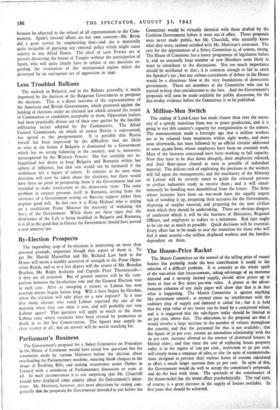The House-Price Racket
The Morris Committee on the control of the selling price of vacant houses has probably made the best contribution it could to the solution of a difficult problem. It is contrary to the whole spirit of the war-crisis that house-owners, taking advantage of an immense demand and a severely limited supply, should drive prices up to three or four or five times pre-war value. A glance at the adver- tisement columns of any daily paper will show that that is in fact what is happening. The Morris Committee is against anything like permanent control ; at normal times no interference with the ordinary play of supply and demand is called for ; but it is held that the 1939 value of any house can be fixed by a competent valuer, and it is suggested that the sale-figure today should be limited to 5o per cent. above that. The objections to the proposal are that it would involve a large increase in the number of valuers throughout the country, and that the personnel for that is not available ; that the figure of 5o per cent. creates an anomalous relationship with the 3o per cent. increase allowed to the owners of destroyed houses in blitzed cities ; and that since the cost of replacing house property today is in the region of too per cent., restriction to 5o per cent. will simply mean a stoppage of sales, or else (in spite of recommenda- tions designed to prevent this) various forms of evasion calculated to effect a much larger increase than 5o per cent. In spite of this, the Government would do well to accept the committee's proposals, and do the best with them. The spectacle of the continuance of the house-racket has the worst effect psychologically. The real cure, of course, is a great increase in the supply of houses available. In five years that should be achieved.


























 Previous page
Previous page